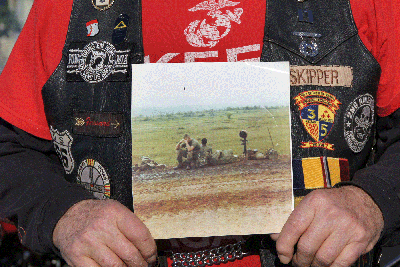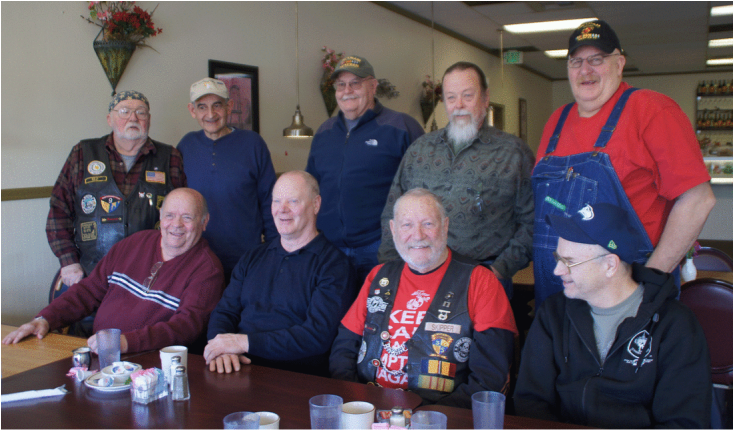 Tom Williams holds a picture of himself grieving Tom Williams holds a picture of himself grieving By Julie Titone A young Marine officer in Vietnam sits alone, holding his bowed head in his hands. He has just lost 13 men in combat. A photo capturing that moment became part of the Veterans Administration case file on Tom Williams, helping confirm his diagnosis of post-traumatic stress disorder. Tom not only knows what PTSD feels like, he knows how to help others who suffer from it. After the war he became a clinical psychologist who edited two seminal books on the subject published by the Disabled American Veterans: "Post-Traumatic Stress Disorders off the Vietnam Veteran" (1980) and "Post-Traumatic Stress Disorders: A handbook for clinicians" (1989). He would own more copies of those books except that he was asked, after 9-11, to send them back to New York and to the Pentagon, so they could be used to help treat people traumatized by the terrorist attacks. Tom is the latest of the kind, resilient veterans who have agreed to help me out at public readings of “Boocoo Dinky Dow: My short, crazy Vietnam War,” which Grady Myers and I wrote. They stand in for Grady, who survived his battlefield wounds but died in 2011. Tom will be my guest reader at Village Books in Bellingham, on March 28 at 4 p.m. These days, Tom is retiree with a dynamite grin who meets other vets regularly for breakfast, brotherhood and shooting the breeze. He invited me to join them recently at the Curious Chef, an aptly named place for me to ask about their military experiences and them to turn the tables with questions for me ("So, what did you think of the war back then?" and "What caused Grady's death?"). They let me snap their picture, shown below. Their camaraderie brought to mind what Tom told me about veterans who recover from the trauma of war. He cited a nationwide survey of 200,000 Vietnam veterans. “It was a beautiful, expensive study," he said. "They came up with a couple of things: The guys who are doing well have a stable relationship with a woman, and they have contact with fellow survivors." Tom lives in a riverside home set apart from the world among the firs of Whatcom County, Washington. When I visited him there, he patiently answered my questions about his life and work even though the sun was shining and he was eager get out on his red Ural motorcycle, which has a sidecar for his lady. A sunny day in the North Cascade Mountains is not a thing to be wasted indoors. We talked about how the movie "The Deer Hunter" made him realize the war’s impact on his psyche; how he and his colleagues designed a national model for helping distressed veterans; how families like his and mine are affected by the ripple effects of stress. We also talked about the persistent “crazy vet” stigma; how the Veterans Administration lost its way; and how humor, like that which punctuates “Boocoo Dinky Dow,” is so important to mental health. I'll elaborate on Tom's experiences and ideas in an upcoming blog post. I’ll also reflect on my last few years of sharing Grady’s stories. It’s been an enriching journey during which I’ve learned a lot about history, and a little about myself.
17 Comments
Les Fitzgerald (top row last on the right in pictue)
3/16/2015 07:09:16 am
Very interesting breakfast, and looking forward to the reading. Contact anytime should you want any information about experiences. Thank You SF Les
Reply
Julie
3/16/2015 01:53:59 pm
Thanks, Les!
Reply
3/18/2015 04:45:59 am
LOOKING FOR 4TH ID FM DAC. TO-& SUPPORTING UNITS-WAnt to TO FIND AN assault huey. Pilot called"HAWK. Come to the reading.
Reply
Lacey Ramirez
8/26/2017 12:45:45 am
Hi Dr. Tom, you once treated my father "Rojo" for PTSD. We are entering a new chapter of his disability as he becomes a senior citizen. We would LOVE to reconnect with you. Can you please contact me?
Reply
Marti Beresford
11/11/2019 06:51:55 pm
Tom, I’ve been looking for you for 5 years. Please get in touch.
Reply
Tom,
Reply
Danny seely
2/22/2017 10:06:32 am
Please contact me at your earliest convenience mr. Tom Williams. phone number call me at 719 470 9178
Reply
Robert eaton
5/15/2017 08:43:04 pm
June 18 1984 you represented in distict court,city County of Denver.
Reply
Lacey Ramirez
8/26/2017 12:43:29 am
Dr. Tom treated my father Rojo for his PTSD. Now my father is becoming a senior citizen, and PTSD has a whole new chapter in our lives. I'd love to get in contact with Dr. Tom if possible. I know my father would LOVE to connect with him. Thank you and God Bless
Reply
Henry "Roby" Wood
3/1/2019 10:24:13 am
I took the picture of Capt. Tom. It was a pretty bleak day as many of them were...I believe we lost Junga as he tried to disarm a booby trap. Tom is a great guy and was a tremendous Marine officer. We had Lt "Heavy" Maehl as a platoon commander and a man who should have been Sgt Major of the Marine Corps., Sgt Hatch another great Marine leader!!!
Reply
8/3/2020 12:33:16 pm
Tom Bratland
Reply
Jim Goodwin, SGT USMC "Goody"
1/15/2022 07:57:46 am
Tom: Missed U all these years. U just disappeared to Phil and me. Over the years I kept searching the internet and now finally found U. Phil died a few years back. He always asked if I had found U. Kitty and I are healthy. We live in Wenatchee. Contact me. Love to see U !!!
Reply
Jim Goodwin
1/17/2022 11:08:49 am
Oh, I forgot where to get a hold of me @ [email protected]. Do U keep up with school? Have U seen where they have a whole clinic now for veterans after what we started back in '78. And now PTSD is well recognized after we pioneered it and took the arrows that pioneers always seem to get. Yeah, I see you with PTSD and me with more Depression than the PTSD. It figures, doesn't it. Who would know better...... ;-))
Reply
Caryl (Leech) Unrein
9/20/2022 03:18:00 pm
Don't know if you remember me from 36 years ago. I was injured on the job when I was paramedic in 1984 and became depressed before my first surgery. You helped me focus on what I could do and a male nurse in your office taught me biofeedback for pain. I still use it to manage pain without opiods even after a number of surgeries. I'll never forget what you did for me. Thank you for caring. And yes I'm still married and we have a wonderful son.
Reply
Will Foreman
12/16/2022 10:53:25 pm
Tom,
Reply
Lori sweetwood, pay.d.
11/10/2023 06:16:40 pm
Hi Tom - I remember Evelyn paley first telling us about u with SO much pride. I was not one of ur deciples but I did focus on working on vets while at du, and then ongoing throughout my career, and what I learned from u in my brief encounters and reading ur books had everything to do with that. My dad was a combat vet. A 1st Lt. in the army. He walked ramrod tall his whole life in spite of the shrapnel that would forever pepper his 6'2" frame. He was a hero. So were you. It is my gratitude for this heroism that drove a big tract of my career, and I just thought on this VA day I would thank u. Most sincerely, Lori
Reply
Leave a Reply. |
Julie Titone is co-author of the Grady Myers memoir "Boocoo Dinky Dow: My short, crazy Vietnam War." Grady was an M-60 machine gunner in The U.S. Army's Company C’s 2nd Platoon, 1st Battalion, 8th Regiment, 4th Infantry Division in late 1968 and early 1969. His Charlie Company comrades knew him as Hoss. Thoughts, comments? Send Julie an email. Archives
November 2018
|

 RSS Feed
RSS Feed